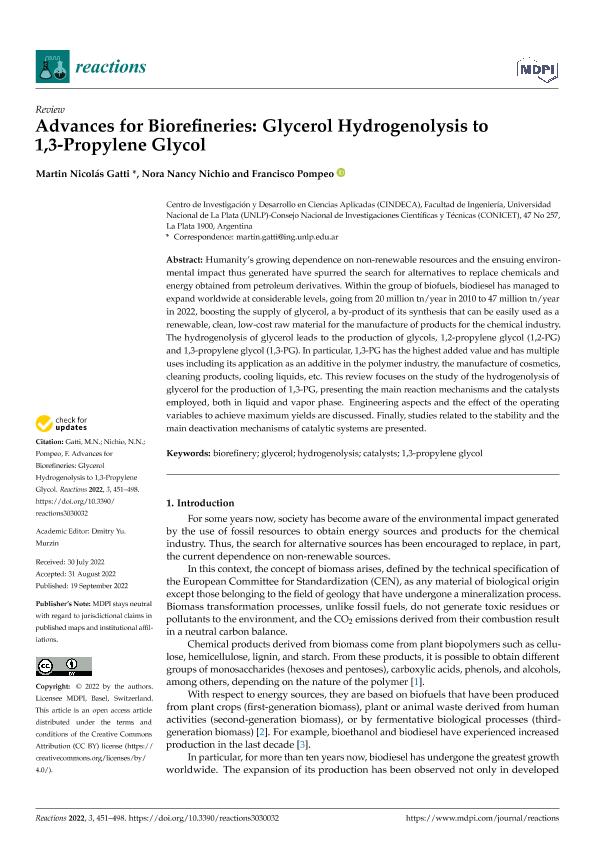Artículo
Advances for Biorefineries: Glycerol Hydrogenolysis to 1,3-Propylene Glycol
Fecha de publicación:
19/09/2022
Editorial:
Multidisciplinary Digital Publishing Institute
Revista:
Reactions
e-ISSN:
2624-781X
Idioma:
Inglés
Tipo de recurso:
Artículo publicado
Clasificación temática:
Resumen
Humanity’s growing dependence on non-renewable resources and the ensuing environmental impact thus generated have spurred the search for alternatives to replace chemicals and energy obtained from petroleum derivatives. Within the group of biofuels, biodiesel has managed to expand worldwide at considerable levels, going from 20 million tn/year in 2010 to 47 million tn/year in 2022, boosting the supply of glycerol, a by-product of its synthesis that can be easily used as a renewable, clean, low-cost raw material for the manufacture of products for the chemical industry. The hydrogenolysis of glycerol leads to the production of glycols, 1,2-propylene glycol (1,2-PG) and 1,3-propylene glycol (1,3-PG). In particular, 1,3-PG has the highest added value and has multiple uses including its application as an additive in the polymer industry, the manufacture of cosmetics, cleaning products, cooling liquids, etc. This review focuses on the study of the hydrogenolysis of glycerol for the production of 1,3-PG, presenting the main reaction mechanisms and the catalysts employed, both in liquid and vapor phase. Engineering aspects and the effect of the operating variables to achieve maximum yields are discussed. Finally, studies related to the stability and the main deactivation mechanisms of catalytic systems are presented.
Palabras clave:
BIOREFINERY
,
GLYCEROL
,
HYDROGENOLYSIS
,
CATALYSTS
,
1,3-PROPYLENE GLYCOL
Archivos asociados
Licencia
Identificadores
Colecciones
Articulos(CINDECA)
Articulos de CENTRO DE INV EN CS.APLICADAS "DR.JORGE J.RONCO"
Articulos de CENTRO DE INV EN CS.APLICADAS "DR.JORGE J.RONCO"
Citación
Gatti, Martin Nicolas; Nichio, Nora Nancy; Pompeo, Francisco; Advances for Biorefineries: Glycerol Hydrogenolysis to 1,3-Propylene Glycol; Multidisciplinary Digital Publishing Institute; Reactions; 3; 3; 19-9-2022; 451-498
Compartir
Altmétricas




